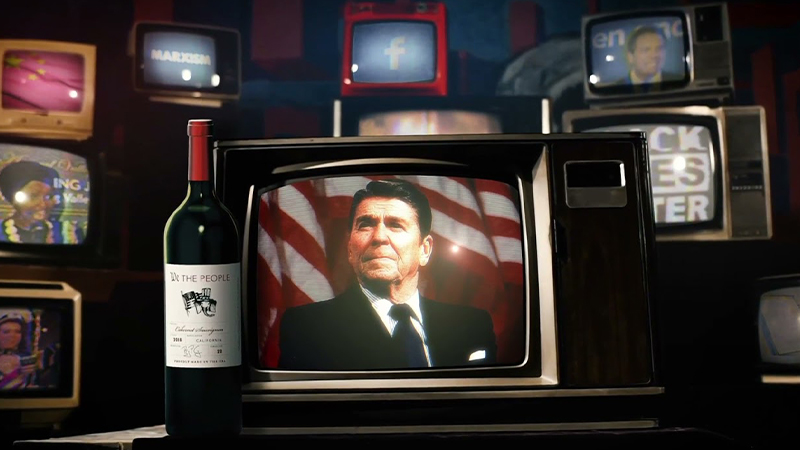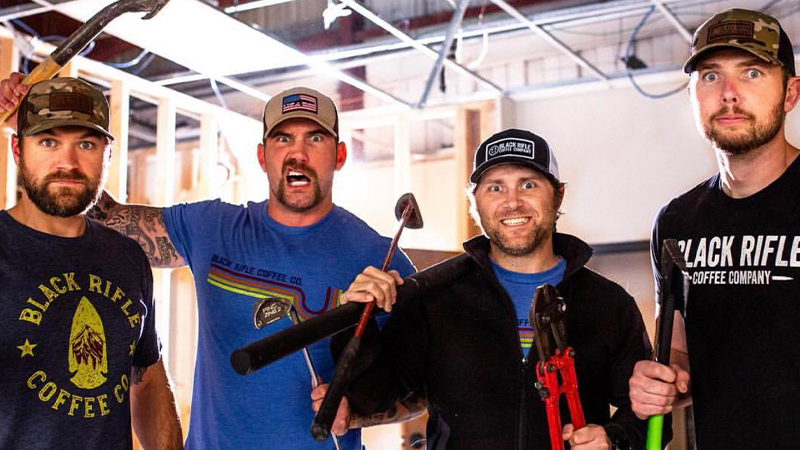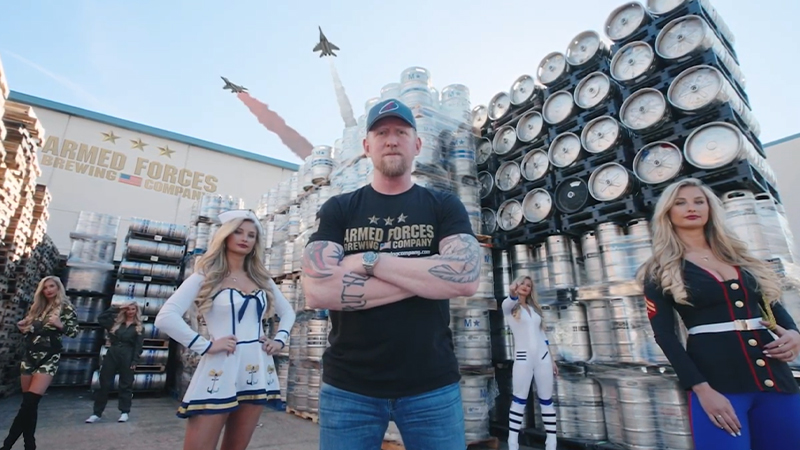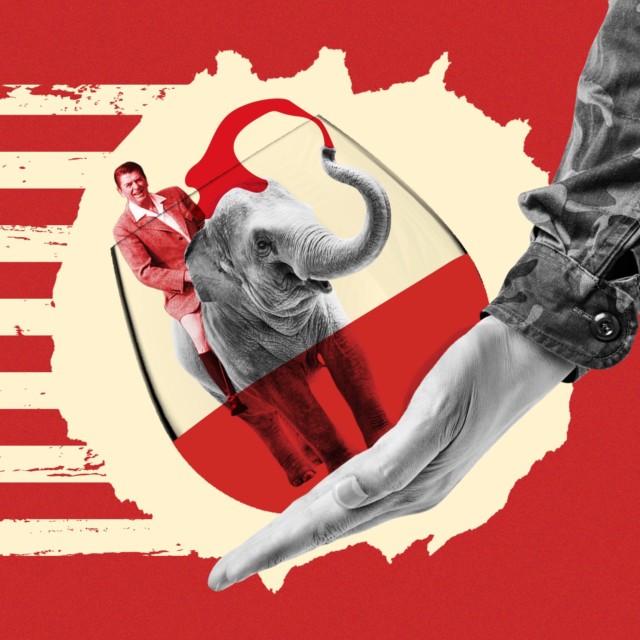This October, VinePair is celebrating our second annual American Beer Month. From beer style basics to unexpected trends (pickle beer, anyone?), to historical deep dives and new developments in package design, expect an exploration of all that’s happening in breweries and taprooms across the United States all month long.
Debates rage on about the wisdom of his foreign policy, labor relations, and general economic vision for America, but it’s settled fact that Ronald Reagan was fond of wine. “The administration of President Ronald Reagan saw wine service in the White House reach a level of interest unmatched since the time of Thomas Jefferson,” wrote author (and former Reagan staffer) Frederick J. Ryan in his 2020 book “Wine in the White House: A History.” “It was at Reagan State Dinners, for example, that both California Zinfandel and Merlot wines were first served at the White House.”
Considering his outstanding oenophilia, you have to wonder what the late 40th president would think of the new wine brand he’s posthumously shilling for these days. In August 2021, Reagan’s visage and voice lit up the right-wing corners of digital media in a video ad for We The People Wines, a new-ish company founded by a Republican operative “dedicated to Conservative [sic] values.” The spot unfolds over nearly two minutes, marrying audio snippets from the Great Communicator’s 1989 farewell address to unrelated visuals of GOP bogeymen (pro-choice activists, Black Lives Matter protests, etc.) and shibboleths like football players, the troops, and the late Pat Tillman, who was both a football player and a troop. The video ends with a closeup on two bottles of We The People wine in front of a flickering fire.
Watching the spot, you may find yourself wondering what any of this has to do with selling wine. The answer is nothing, but also… maybe everything. As it turns out, there’s big money to be made selling “conservative” versions of everyday beverages. Last year, Black Rifle Coffee Company, maybe the most prominent conservative food and beverage brand, pulled down $163 million in revenue, and has spawned a dozen imitators in the process. We The People Wines, along with Armed Forces Brewing Company — an unrelated contract brewer that launched this summer with a viral video featuring former Navy SEAL and current Fox News fixture Rob O’Neill — represent early efforts to duplicate that success in the beverage alcohol business.
Will it work? “These firms are embracing a classic niche strategy,” one marketing professor told VinePair, but beer and wine “are not as easy as coffee.” Then again, $163 million is a helluva reason to give it a shot.

The rise of DTC conservative commerce
Before we get into the long-term viability of Barry Goldwater-approved booze, let’s quickly get up to speed on what the shit is going on here, generally speaking. These days, there’s money to be made marketing brands with political posturing to potential customers on both the right and left wings of the American body politic. An Axios/Harris 100 poll from March 2021 found that firms with stated conservative values, like Chick-fil-A and Hobby Lobby, and firms with more overtly progressive stances (think Patagonia, REI) were both enjoying better reputations among American consumers. “Americans are leaning into companies that have strong political positions, in the wake of one of the country’s most divisive election years,” wrote Axios’s Sara Fischer and Danielle Alberti.
But while mainstream companies across the political spectrum have begun to broadcast their corporate beliefs more lately, conservative firms on the fringes have decades of history hawking goods to right-wing Americans. And the goods are often… well, not so good. In a 2012 story for The Baffler, historian and “chronicler extraordinaire of modern conservatism” Rick Perlstein traced the beginning of this style of direct, partisan commerce to the early ‘60s, a young Republican operative, and a list of 12,500 GOP donor addresses shadily copied by hand from congressional files. “Subscriber lists to ideological organs are pure gold to the third-party interests who rent them as catchments for potential customers,” explained Perlstein.
What started as direct-mail campaigns raising money for dubious causes (with a nice vig going to the direct-mailer who controlled the list, of course) metastasized into something entirely more commercial once the internet came along. Email marketing added a whole new dimension to snake oil sales. And today, surgical precision of social media marketing, combined with record-breaking rates of political polarization and tribalism, and the rise of direct-to-consumer e-commerce, have pushed all this in colorful new directions. The time is ripe for conservative brands to find, pitch, and profit off aggrieved conservatives seeking alternatives to the products they perceive as “liberal.”
Conservative clothes? Try Nine Line Apparel or Grunt Style. Home goods? MyPillow has your pillow. And if dietary supplements are your game, Alex Jones is the name. The terminally online InfoWars conspiracy theorist has made millions of dollars shilling stuff like anti-coronavirus toothpaste and testosterone pills to help users “push back in the fight against the globalist agenda.” These brands vary in quality and griftiness (you can guess where Jones’ potions land on that axis) but they share a tried-and-true message: Don’t buy stuff from companies that are (or at least, seem) liberal, buy our stuff instead. Take Black Rifle Coffee, for example. “I want people who voted for Trump to know that there is another option for you,” said the company’s CEO, Evan Hafer, in 2017. Starbucks chief exec “Howard Schultz doesn’t want your business. I do.”

Drinks for respecting the troops and owning the libs
An even more direct way of saying the same thing: “This is a huge entrepreneurial opportunity. You don’t have to give money to people that hate you; you can give money to people who share your values.” That’s how “Fox & Friends Weekend” co-host Will Cain teed up We The People Wine’s founder, Ryan Coyne, in an August 2021 “interview” about the company. (It watches more like sponsored content than a lot of actual sponsored content.)
“Absolutely right, absolutely right,” Coyne responded. On the program, the Republican marketing operative claimed that We The People was “selling tens of thousands of bottles every day” thanks to the Reagan-inflected ad, which he said had racked up over 7 million views in just a few days. Those sales figures are impossible to verify independently, and VinePair was unable to reach Coyne for comment. (A representative for Coyne, James Davis, responded to our inquiry about We The People Wines and agreed in a phone conversation to coordinate an interview before press time, then stopped responding.) But if Coyne counts units sold like he does views, the sales numbers he gave “Fox & Friends” may be padded: A VinePair review of the brand’s social media accounts shows a view count closer to 2 million across all platforms.
Black Rifle didn’t come up on “Fox & Friends,” but in another interview Coyne namechecked the coffee firm unprompted. “There were no brands saying what we’ve been saying,” he said in an early September interview with former New York Yankees strength coach/current grindset YouTuber Dana Cavalea. “There’s a couple that people reference that we know well. … Black Rifle Coffee is a good example. They are very pro-military, but I think most people identify them as similarly situated, [based on] what they support and believe in, as we are.”
But what if you’re a conservative who doesn’t like wine? Or perhaps you’re simply holding out for a booze brand that exalts American service members more explicitly than We The People Wines, or the bevy of veteran-owned, military-themed breweries and liquor brands already on the market? Never fear! Armed Forces Brewing Company is here.
“We started in Annapolis, Md., initially as Seawolf Brewery, which was pretty much a tribute to Navy service,” Alan Beal, AFBC’s chief executive, tells VinePair. (The official launch coincided with the 2017 Military Bowl, naturally.) After being “inundated” with interest from drinkers who wanted beers fêting other branches of the U.S. military, Beal explains, “We decided to develop some other concepts, other brands. … It kind of morphed into Armed Forces Brewing Company.” The firm now has four beer lines: Seawolf, Soldier, Airman, and Jarhead (“invading soon”), all of which are contract-brewed at New Realm Brewing Co.’s Virginia Beach plant. Beal, who did not serve in any branch of the military (though he comes from a military family), describes AFBC as a sort of “Joint Base Command Center” for the consumer-facing brands.
In that analogy, the CEO would be the ranking officer. But after watching AFBC’s promotional video — released around Independence Day and filmed in the please-go-viral style that Dollar Shave Club pioneered in 2012 — viewers could be forgiven for thinking the company’s commandant was feature player Rob O’Neill, the former Navy SEAL who is widely credited with firing the shots that killed Osama Bin Laden. (He wrote a book about it.) The former SEAL Team 6 “operator” is AFBC’s director of military relations and national brand ambassador, and holds a position on its board of directors.
The video, a pitch to would-be investors to buy shares in AFBC via its ongoing equity crowdfunding raise, is shot through with lowest-common-denominator gags. O’Neill pours a can of “piss water” into a toilet; O’Neill shoves a “slackster coffee house misanthrope;” O’Neill calls in a drone strike on a building labeled “pretentious foreign brewery.” Women — or is it the same woman? — in chesty approximations of actual military uniforms often appear in the frame, but never speak. The spot concludes with an anti-mask joke.
It’s not as baldly partisan as We The People’s brand positioning and video, which at first glance could be mistaken for a campaign attack ad. An appetite for war, after all, is one of the few things most Republican and Democrat politicians still have in common. But while AFBC’s video lacks Reagan cameos, its jingoistic visions of American patriotism and military identity suggest a decidedly conservative worldview. As does O’Neill’s participation. Though the AFBC brand ambassador claims affiliation with neither party, he’s a regular guest on conservative cable outlets like Fox News and Newsmax, rails about “illegals,” “leftists,” and “stolen elections” on Twitter, and praises right-wing influencers like Dinesh D’Souza and Candace Owens.
Nevertheless, Beal denies that his company has a political bent. “Rob’s his own man,” he says of his company’s brand ambassador. He points out that O’Neill has “even dinged President Trump a couple times out there in the Twitterverse.” “I’m 57 years old, I remember when Democrats and Republicans could go to a taproom or a bar, have a beer together and talk politics, and not want to kill each other,” Beal says. “It’d be great to get back to those days.”

Building ‘psychological ownership’
The U.S., by most accounts, is not headed back to those days any time soon. That may be bad news for the country, but it’s good news for a company looking to turn partisan fervor into consumer spending — especially in a competitive market like retail beverage alcohol, where brand-building is vital to sustained success. “These firms are embracing a classic niche strategy,” says Tim Calkins, clinical professor of marketing and associate marketing chair at Northwestern University’s Kellogg School of Management. “These are big, crowded markets, and one of the classic ways to enter a very cluttered market is to find a way to really resonate with a small group of people. That’s what these firms are very clearly doing.”
Calkins says that conservative start-ups in familiar product categories stand to benefit from a few compounding market factors: low barriers to entry that require little product innovation; powerful, cheap targeted social media marketing that can find like-minded customers like never before (no more hand-copied donor addresses!); and established competition that is loathe to dip its toe into politics of any persuasion.
Politically charged products are “a segment that other [firms] are not likely to go,” says Calkins. “It’s not likely that A-B InBev is going to launch a beer that directly competes [with Armed Forces Brewing Company], because the area is polarizing. That is the challenge, but also perhaps the best part of the idea.” AFBC’s approach is niche in more ways than one: Not only is it going after pro-military beer drinkers with its marketing, but its distribution plan is built around the thousands of on-base military exchanges across the country. “We’re a great fit for those stores,” says Beal. “They do about $359 million in retail package sales a year. That’s a big niche market.” They’re in 10 so far, plus Total Wines, and were recently approved for Wegmans.
Of course, table stakes still apply. As Calkins points out, beverage alcohol products “are not as easy as coffee” to market due to regulatory hurdles and, in beer’s case, freshness concerns, too. But upstream of logistics is basic drinkability: A firm that doesn’t produce a competitive product won’t be able to defend even a well-fortified partisan niche forever. On this front, AFBC may have work to do; its Seawolf Special Hops IPA was not well received by a reviewer at military publication Task and Purpose. “No part of it is enjoyable, even if you’re the sort of masochist who loves having their taste buds scorched by more hops than a rabbit farm,” concluded writer Matt Sampson.
(“We’ve moved on from that,” responds Beal, when prompted. “Of course I read the article. … I guess he didn’t like our beer, and that’s absolutely fine.”)
By contrast to AFBC’s base-based model, We The People Wines leans on direct-to-consumer e-commerce sales to get its ~$30 bottles of Cabernet Sauvignon and Chardonnay to thirsty conservatives in 17 states. But according to both Calkins and fellow marketer Nathalie Spielmann, Ph.D., the companies are similarly savvy in the way they engender ownership and belonging through their products and messaging. It’s a marketing tactic that encourages “psychological ownership” based on an “idealized national identity,” Spielmann, an associate professor of marketing at France’s NEOMA Business School and a diploma candidate in the prestigious WSET program, tells VinePair.
“What these brands are trying to say is, ‘I’m going to put out this product, [whether] it’s coffee or beer or wine, that clearly speaks to one half of the population or one political ideology, and I’m going to promote this idealized national identity to those people and give them a sense of psychological ownership, which will then trickle down to more loyalty towards my brand because my brand is representing what people actually have as values.’” It’s why Coyne talks about customers “joining our community,” and We The People bottles are emblazoned with the slogan “every sip is another vote.”
AFBC takes the ownership pitch even further, offering people the opportunity to literally buy into its professed values by purchasing shares in the firm. Shares start at $200; the highest tier, “operator,” requires an investment of $50,000 or more. According to a review of the offering materials by Ben Ostrow, a former private-equity investment analyst, Beal and his team are valuing the company at $38.6 million — and that’s before any capital raised this round. (Ostrow performed a similar analysis on BrewDog USA’s offering. Both companies use the same federal regulation, Regulation A, to conduct crowdfunding equity raises exempted from the Securities and Exchange Commission’s registration requirements.) It’s an eye-popping valuation for a brewing company that’ll produce just ~2,000 barrels this year, and doesn’t even own a physical plant. But for investors with like-minded politics, the appeal of being a part of something can be a powerful draw. “When you invite people to be investors, all of a sudden they are part of the brand, they are part of the movement,” says Calkins. “It’s interesting: You see political campaigns do exactly the same thing. Political campaigns are constantly asking people to be part of an advisory group, or to fill out the survey, or to provide their perspective. It’s the same basic strategy of trying to make people feel really connected.”
***
At this point you may be asking yourself: Are conservatives truly alienated by beverage alcohol brands to the point that they need Republican Chardonnay and rally-‘round-the-flag IPA?
To Spielmann, this question misses the forest for the trees. The political polarization gripping the U.S. isn’t going away, and the fact that conservative beverage alcohol firms don’t have Black Rifle’s Starbucksian foil is hardly a non-starter. “Why wouldn’t you capitalize on a market trend?” she asks. The emergence of booze brands like We The People and AFBC (and all the other conservative commerce that preceded them) are, from a marketing standpoint at least, an inevitable outcome of the struggling American experiment. “Are these brands revolutionizing [the marketing approach from] what was in the past the war effort, or the Cold War, these types of discussions? No, they’re just repackaging it for a target market that is much more attuned to that message,” says Spielmann. There’s nothing new under the sun, selling products that reinforce customers’ sense of belonging and ownership least of all.
At the end of We The People’s original ad, Reagan intones: “Once you begin a great movement, there’s no telling where it will end.” It’s a fitting sentiment. Reagan was responsible for mainstreaming the conservative political project, but there’s simply no way he could have guessed that his dogmatic zeal for electioneering abroad and the upward redistribution of wealth at home would one day give rise to a right-wing wine company made in his image. But here we are anyway. The Gipper is gone, Trump is still here, and bipartisanship seems more like a punchline than ever. In this era, it seems inevitable that Black Rifle-fication of the booze business will continue. We know why and how; the only question left is, “What took so long?”
This story is a part of VP Pro, our free platform and newsletter for drinks industry professionals, covering wine, beer, liquor, and beyond. Sign up for VP Pro now!
